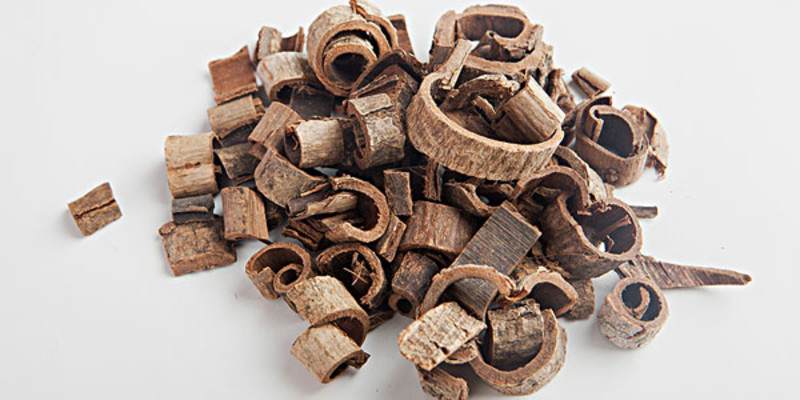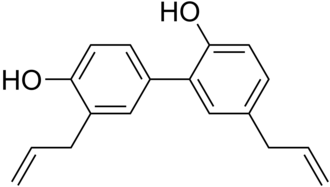
Magnolia officinalis, commonly known as magnolia bark, is a traditional herbal medicine highly valued for its rich content of bioactive compounds. Honokiol and Magnolol are the two primary chemical components extracted from magnolia bark. Although they share similar chemical structures, they differ in terms of efficacy and applications.
Introduction to Honokiol
Chemical Structure
Honokiol is a symmetrical biphenolic compound containing two hydroxyl (-OH) groups and multiple conjugated double bonds, giving it excellent lipid solubility. This structure contributes to its potent biological activities.

Benefits
- Anti-inflammatory Properties: Reduces chronic inflammation by inhibiting pro-inflammatory cytokines such as TNF-α and IL-6.
- Antioxidant Effects: Effectively neutralizes free radicals, protecting cells from oxidative stress.
- Neuroprotection: Demonstrates protective effects on nerve cells, improving memory and cognitive function in experimental studies.
- Anti-cancer Potential: Induces apoptosis in tumor cells and inhibits tumor angiogenesis.
- Sedative and Anxiolytic Effects: Regulates central neurotransmitters, such as GABA receptors, to alleviate anxiety and improve sleep quality.
- Antimicrobial and Antiviral Effects: Exhibits significant inhibitory effects against various pathogens.
Introduction to Magnolol
Chemical Structure
Magnolol is also a biphenolic compound, closely resembling Honokiol. However, the positions of its hydroxyl (-OH) groups differ, leading to variations in its biological activity and pharmacological effects.

Benefits:
- Anti-inflammatory and Antioxidant Effects: Magnolol demonstrates excellent ability to suppress reactive oxygen species and pro-inflammatory factors.
- Cardiovascular Protection: Improves endothelial function, lowers blood pressure, and reduces cholesterol levels, thus minimizing the risk of cardiovascular diseases.
- Antimicrobial Effects: Effectively inhibits various bacteria and fungi.
- Skin Health: Widely used in cosmetics for its anti-aging, antibacterial, and skin barrier repair properties.
- Metabolic Regulation: Shows promise in regulating blood sugar and lipid metabolism abnormalities in experimental research.
Similarities Between Honokiol and Magnolol
- Common Source: Both are extracted from the bark, roots, or leaves of Magnolia officinalis.
- Chemical Properties: Both are lipophilic compounds, easily crossing cell membranes and exhibiting a broad range of pharmacological effects.
- Primary Benefits: Both have anti-inflammatory, antioxidant, antimicrobial, and neuroprotective properties, making them highly valued in health and medical fields.
- Safety: Both are considered natural and safe active ingredients with minimal side effects when used in appropriate doses.
Differences Between Honokiol and Magnolol
| Characteristic | Honokiol | Magnolol |
| Chemical Structure | Symmetrical biphenolic structure, differing hydroxyl positions from Magnolol | Biphenolic structure with distinct hydroxyl group positioning |
| Anti-cancer Effects | Exhibits stronger anti-tumor activity by inducing apoptosis in cancer cells | Weaker anti-cancer effects, more focused on metabolic regulation |
| Cardiovascular Protection | Less significant effects | More pronounced effects |
| Sedative and Anxiolytic | More notable effects, alleviating anxiety and improving sleep | Less prominent sedative effects |
| Skin Applications | Focuses more on anti-inflammatory and antioxidant properties | More research on antibacterial and skin barrier repair in cosmetics |
Conclusion
As the primary active components of magnolia bark, Honokiol, and Magnolol share similarities in chemical structure and biological activities but have distinct characteristics. Honokiol excels in anti-cancer, neuroprotective, and sedative properties, while Magnolol shows advantages in cardiovascular protection and skin health. Selecting the appropriate compound based on specific needs can maximize their health benefits.
Stanford Chemical offers over 1,300 herbal extract products, including Honokiol and Magnolol. If you require any of our products, please feel free to contact us for a quote.
